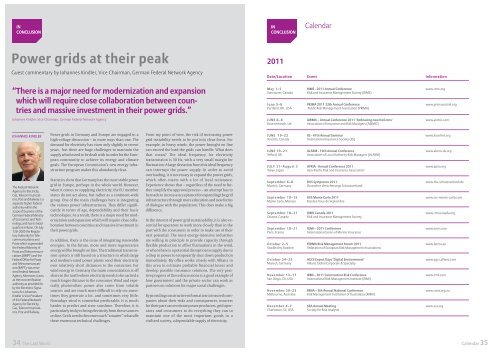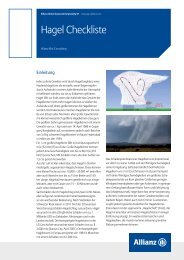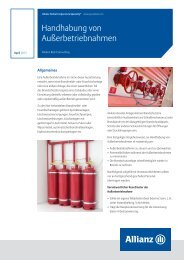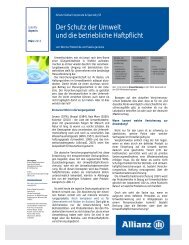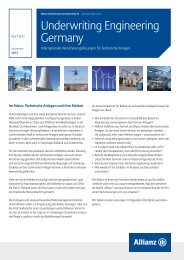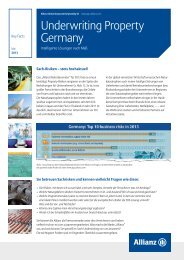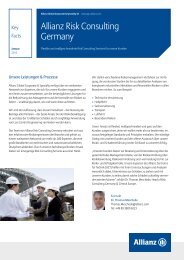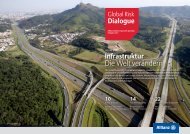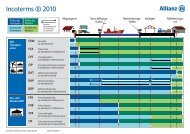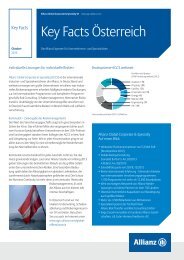Energy - Allianz Global Corporate & Specialty
Energy - Allianz Global Corporate & Specialty
Energy - Allianz Global Corporate & Specialty
Create successful ePaper yourself
Turn your PDF publications into a flip-book with our unique Google optimized e-Paper software.
IN<br />
CONCLUSION<br />
Power grids at their peak<br />
Guest commentary by Johannes Kindler, Vice Chairman, German Federal Network Agency<br />
“There is a major need for modernization and expansion<br />
which will require close collaboration between countries<br />
and massive investment in their power grids.”<br />
Johannes Kindler, Vice Chairman, German Federal Network Agency<br />
JOHANNES KINDLER<br />
The Federal Network<br />
Agency for Electricity,<br />
Gas, Telecommunications,<br />
Post and Railway is a<br />
separate higher federal<br />
authority within the<br />
scope of business of the<br />
German Federal Ministry<br />
of Economics and Technology,<br />
and has its headquarters<br />
in Bonn. On July<br />
13th 2005 the Regulatory<br />
Authority for Telecommunications<br />
and<br />
Posts which superseded<br />
the Federal Ministry of<br />
Posts and Telecommunications<br />
(BMPT) and the<br />
Federal Office for Posts<br />
and Telecommunications<br />
(BAPT), was renamed<br />
Federal Network<br />
Agency. Moreover, it acts<br />
as the root certification<br />
authority as provided for<br />
by the Electronic Signatures<br />
Act. Johannes<br />
Kindler is Vice President<br />
of the Federal Network<br />
Agency for Electricity,<br />
Gas, Telecommunications,<br />
Post and Railway.<br />
34 The Last Word<br />
Power grids in Germany and Europe are engaged in a<br />
high-voltage discussion – in more ways than one. The<br />
demand for electricity has risen only slightly in recent<br />
years, but there are huge challenges to maintain the<br />
supply which need to be dealt with in order for the European<br />
community to achieve its energy and climate<br />
goals. The European Commission’s new energy infrastructure<br />
program makes this abundantly clear.<br />
Statistics show that Germany has the most stable power<br />
grid in Europe, perhaps in the whole world. However,<br />
when it comes to supplying electricity, the EU member<br />
states do not act alone, but rather as a continent-wide<br />
group. One of the main challenges here is integrating<br />
the various power infrastructures. They differ significantly<br />
in terms of age, dependability and their basic<br />
technologies. As a result, there is a major need for modernization<br />
and expansion which will require close collaboration<br />
between countries and massive investment in<br />
their power grids.<br />
In addition, there is the issue of integrating renew able<br />
energies. In the future, more and more regenera tive<br />
energy will be brought on line. The traditional transmission<br />
system is still based on a structure in which large<br />
and medium-sized power plants send their electricity<br />
over relatively short distances to the consumer. For<br />
wind energy in Germany the main concentration is off<br />
shore in the north where electricity needs to be carried a<br />
much longer distance to the consumer. Wind and especially<br />
photovoltaic power also come from volatile<br />
sources and are much more difficult to rely on: some -<br />
times they generate a lot, and sometimes very little.<br />
Nowadays wind is somewhat predictable. It is much<br />
harder to predict and steer sunshine. Therefore, it is<br />
particularly tricky to bring electricity from these sources<br />
on line. Grids need to become much “smarter” to handle<br />
these enormous technical challenges.<br />
From my point of view, the risk of increasing power<br />
grid instability needs to be put into clear focus. For<br />
example, in heavy winds, the power brought on line<br />
can exceed the load the grids can handle. What does<br />
that mean? The ideal frequency for electricity<br />
transmission is 50 Hz, with a very small margin for<br />
fluctuation. A large deviation from this ideal frequency<br />
can interrupt the power supply. In order to avoid<br />
overloading, it is necessary to expand the power grids,<br />
which often meets with a lot of local resistance.<br />
Experience shows that – regardless of the need to further<br />
simplify the approval process – an attempt has to<br />
be made to increase acceptance for expanding the grid<br />
infrastructure through more education and new forms<br />
of dialogue with the population. This does make a big<br />
difference.<br />
In the interest of power grid sustainability, it is also essential<br />
for operators to work more closely than in the<br />
past with the consumers in order to make use of their<br />
vast potential. The most energy-intensive industries<br />
are willing in principle to provide capacity through<br />
flexible production to offset fluctuations in the wind,<br />
or when there is a potential disruption to supply due to<br />
a drop in power to temporarily shut down production<br />
immediately. My office works closely with <strong>Allianz</strong> in<br />
this area to estimate probable financial losses and<br />
develop possible insurance solutions. The very posi -<br />
tive progress of these discussions is a good example of<br />
how government and the private sector can work as<br />
partners on solutions for major social challenges.<br />
By providing constructive information to insured companies<br />
about their risks and consequences, insur ers<br />
for their part can motivate power producers, grid operators<br />
and consumers to do everything they can to<br />
maintain one of the most important goods in a<br />
civilized society, a dependable supply of electricity.<br />
IN<br />
CONCLUSION<br />
2011<br />
Calendar<br />
Date/Location Event Information<br />
May 1–5 RIMS - 2011 Annual Conference www.rims.org<br />
Vancouver, Canada Risk and Insurance Management Society (RIMS)<br />
J une 5–8 PRIMA 2011 32th Annual Conference www.primacentral.org<br />
Portland, OR , USA Public Risk Management Association (PRIMA)<br />
J UNE 6–8 AIRMIC - Annual Conference 2011 "Embracing new horizons" www.airmic.com<br />
Bournemouth, UK Association of Insurance and Risk Managers (AIRMIC)<br />
J UNE 19 – 22 IIS - 47th Annual Seminar www.iisonline.org<br />
Toronto, Canada International Insurance Society (IIS)<br />
J UNE 19–21 ALARM - 19th Annual Conference www.alarm-uk.org<br />
Telford, UK Association of Local Authority Risk Managers (ALARM)<br />
JULY 31–August 3 APRIA - Annual Conference 2011 www.apria.org<br />
Tokyo, Japan Asia-Pacific Risk and Insurance Association<br />
September 6–8 DVS Symposion 2011 www.dvs-schutzverband.de<br />
Munich, Germany Deutscher Versicherungs-Schutzverband<br />
September 10–15 RVS Monte Carlo 2011 www.rvs-monte-carlo.com<br />
Monte Carlo, Monaco Rendez-Vous de Septembre<br />
September 18–21 RIMS Canada 2011 www.rimscanada.org<br />
Ottawa, Canada Risk and Insurance Management Society<br />
September 18–21 IUMI – 2011 Conference www.iumi.com<br />
Paris, France International Union of Marine Insurance<br />
O c tober 2–5 FERMA Risk Management Forum 2011 www.ferma.eu<br />
Stockholm, Sweden Federation of European Risk Management Associations<br />
O c tober 24–25 AGCS Expert Days "Digital Environments" www.agcs.allianz.com<br />
Munich, Germany <strong>Allianz</strong> <strong>Global</strong> <strong>Corporate</strong> & <strong>Specialty</strong><br />
N o vember 13–17 IRMI – 2011 Construction Risk Conference www.irmi.com<br />
San Diego, CA, USA International Risk Management Institute (IRMI)<br />
N o vember 20–23 RMIA – 8th Annual National Conference www.rmia.org.au<br />
Melbourne, Australia Risk Management Institution of Australasia (RMIA)<br />
December 4–7 SRA Annual Meeting www.sra.org<br />
Charleston, SC, USA Society for Risk Analysts<br />
Calendar 35


